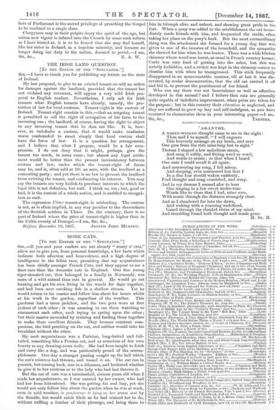A PEASANT CLERGY.
[To THE EDITOR OF THE "SPECTATOR."] SIR,—You are always a consistent advocate for making the Church of England as Liberal as possible in point of doctrine, would you not also wish that the privilege of joining the ranks of her ministry were more liberally extended to the different classes of the community ?
I should be the last to undervalue the advantage of having an educated clergy, but are we not sacrificing too much for the sake of a clergy of gentlemen ? The principle of the Church of Eng- land seems to be that unless a man is wealthy enough to pay for a University education, he cannot possibly be fit to preach the Gospel to others. How alien this principle is to the practice of the Founder of Christianity need not be stated. It seems no less alien to the true interests of the Church. It is not so much on account of dissent from her doctrine as on account of what may be termed her aristocratic exclusiveness that the Church of England has so little influence on the lower ranks of society. The humbler classes feel but little consolation in sitting Sunday after Sunday hearing the same formal platitudes, enunciated in the same listless tone so characteristic of our clergy. They want reality, and this can only be given them by mon who can sympathize with them because they have undergone the same anxious trials.
I would, therefore, exclude no man on account of his position in life from serving the Church as a properly ordained minister, but I would, of course, have among the clergy different classes with their separate duties to perform, and I would have Colleges where the poor might be educated for the ministry at a cheap rate.
We may learn much from the Church of Rome in this respect ; it has been said that the Church was the great democracy of the middle ages, principally became she received into the sacerdotal ranks members of the very lowest classes, who might, and some- times did, become Popes or Bishops on a level with the most powerful kings or feudal lords. The way she received into her ranks the mendicant orders, such a contrast to our policy in regard to dissent, is another instance of the same kind. In conclusion, Sir, I would ask whether in an age when what is called democracy is confessedly advancing the Church of England alone is to resist the tide. At a time when working men are talked of as fit mem-
bers of Parliament is the sacred privilege of preaching the Gospel to be confined to a single class.
Clergymen may in their pulpits decry the spirit of the age, but unless new vigour is infused into the Church by some such reform as I have hinted at, it is to be feared that she may find herself, like her sister in Ireland, in a hopeless minority, and because no longer doing her duty to the nation, doomed to perish.—I am,







































 Previous page
Previous page